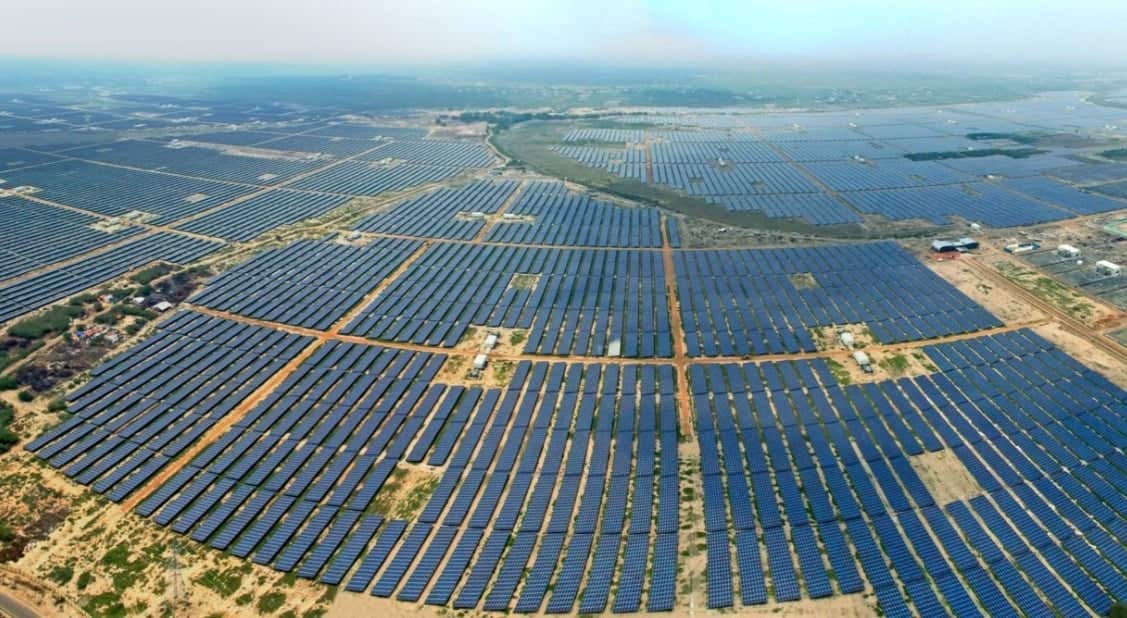The world’s largest clean energy plant is visible from space and can power Switzerland
This project, spanning an area five times the size of Paris, can be viewed from space and produces enough electricity to power Switzerland.

This project, spanning an area five times the size of Paris, can be viewed from space and produces enough electricity to power Switzerland. (CREDIT: Adani Green Energy)
In the heart of western India, an energy transformation of monumental proportions is underway. This project, spanning an area five times the size of Paris, produces enough electricity to power Switzerland. It is reshaping vast stretches of barren salt desert into a colossal source of clean energy.
Spearheaded by Sagar Adani, the executive director of Adani Green Energy Limited (AGEL), this endeavor is part of a broader vision to redefine India's energy landscape.
"I don’t even do the math any more," remarked Sagar Adani in a recent interview, underscoring the sheer magnitude of the undertaking. AGEL, a subsidiary of the Adani Group, one of India's foremost business conglomerates, is leading the charge in constructing this expansive solar and wind power facility in Gujarat.
A blade for a wind turbine produced at an Adani Group factory in the Indian city of Mundra. (CREDIT: Punit Paranjpe/AFP/Getty Images)
With an estimated investment of around $20 billion, this venture is set to become the largest renewable energy park globally upon completion in approximately five years.
The significance of the Khavda Renewable Energy Park extends beyond its sheer size. It represents a critical step in India's quest to combat pollution, achieve its climate objectives, and address the escalating energy demands of its burgeoning population.
Despite India's heavy reliance on coal, accounting for 70% of its electricity generation, initiatives like the Khavda park are instrumental in diversifying the energy mix and reducing carbon emissions.
Related Stories
Situated just 12 miles from the volatile border between India and Pakistan, the park spans over 200 square miles, making it the largest power plant on the planet, irrespective of its energy source.
Adani emphasized the suitability of the location, citing its vast, uninhabited expanse devoid of wildlife or vegetation as ideal for such a monumental endeavor.
The Adani Group's commitment to green energy hasn't wavered, despite facing challenges in recent years. Following allegations of fraud by an American short-seller in early 2023, the conglomerate weathered a tumultuous period, marked by a significant decline in stock value and the personal fortune of Gautam Adani, the group's chairman. Nonetheless, the company has since rebounded, reaffirming its dedication to clean energy initiatives.
An employee inspecting solar panels at an Adani Group factory in Mundra. (CREDIT: Punit Paranjpe/AFP/Getty Images)
With plans to invest $100 billion in energy transition over the next decade, Adani Group's pivot towards renewable energy aligns with India's ambitious climate targets.
Prime Minister Narendra Modi has pledged to derive 50% of the country's energy from renewable sources by the end of the decade, with a goal of achieving net-zero emissions by 2070. AGEL aims to contribute significantly to these targets, aiming to generate nearly 30 GW of electricity from the Khavda park alone, out of India's targeted 500 GW of non-fossil fuel capacity by 2030.
This project, spanning an area five times the size of Paris, is reshaping vast stretches of barren salt desert into a colossal source of clean energy. (CREDIT: Adani Green Energy)
Adani emphasized the urgency of transitioning to renewable energy, highlighting India's escalating energy demands amidst rapid economic growth. As the world's third-largest energy consumer, India's energy consumption is poised to surge further, driven by factors such as urbanization and climate change-induced heatwaves.
The proliferation of air conditioners, in particular, is expected to drive substantial electricity demand, necessitating a shift away from fossil fuels to avert catastrophic climate consequences.
As the world's third-largest energy consumer, India's energy consumption is poised to surge further, driven by factors such as urbanization and climate change-induced heatwaves. (CREDIT: Punit Paranjpe/AFP/Getty Images)
However, critics have pointed out the Adani Group's continued investments in fossil fuels, despite its green energy aspirations. Tim Buckley, director of the Sydney-based think tank Climate Energy Finance, criticized the conglomerate's dual approach, citing its significant coal mining operations, including the controversial Carmichael Coal Mine in Australia.
Adani defended the group's diversified approach, acknowledging the imperative of addressing India's immediate energy needs while accelerating renewable energy deployment. He underscored the challenge of balancing economic development with environmental sustainability, emphasizing India's right to prioritize the welfare of its citizens.
The Khavda Renewable Energy Park symbolizes India's commitment to a cleaner, sustainable energy future. While challenges persist, the strides made by entities like the Adani Group underscore the potential for transformative change in India's energy landscape, setting a precedent for sustainable development on a global scale.
For more science news stories check out our New Innovations section at The Brighter Side of News.
Note: Materials provided above by The Brighter Side of News. Content may be edited for style and length.
Like these kind of feel good stories? Get the Brighter Side of News' newsletter.



